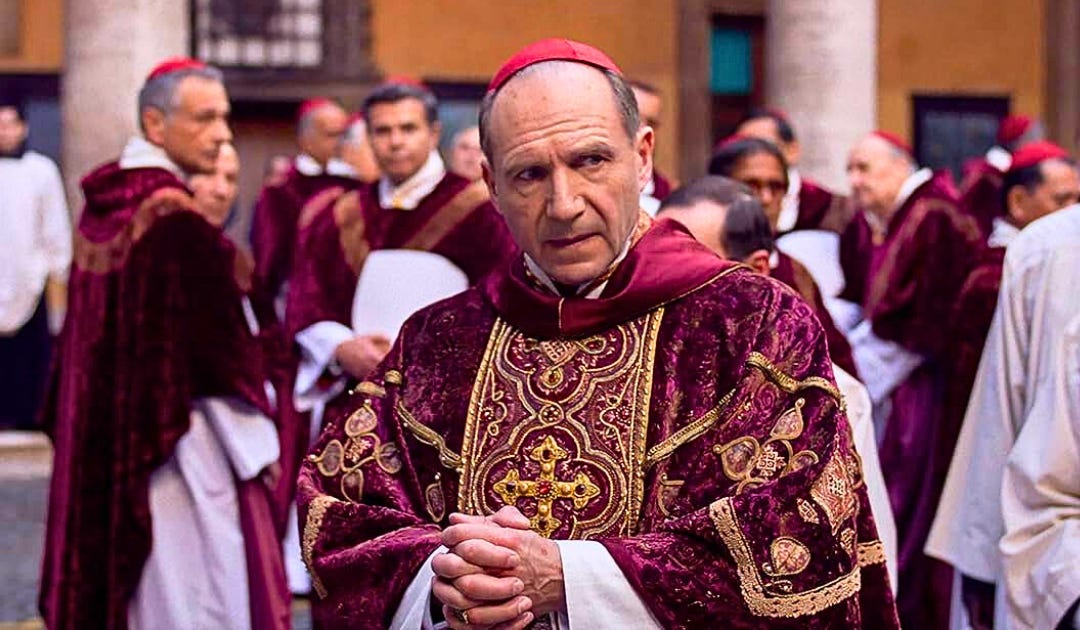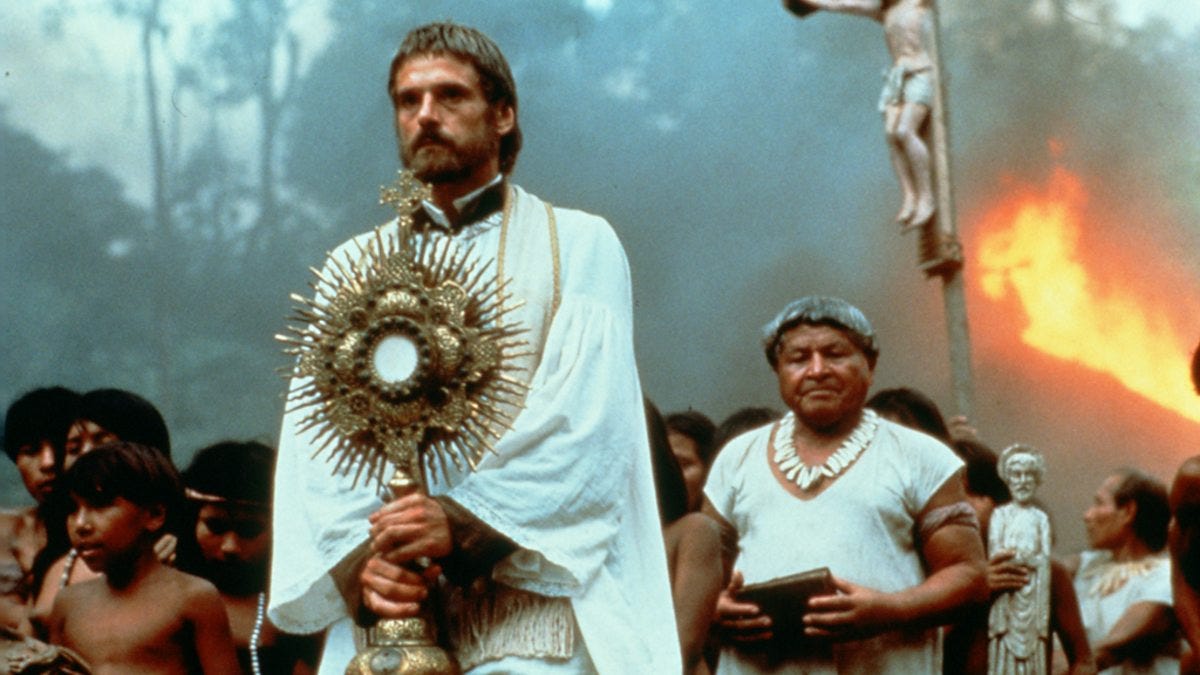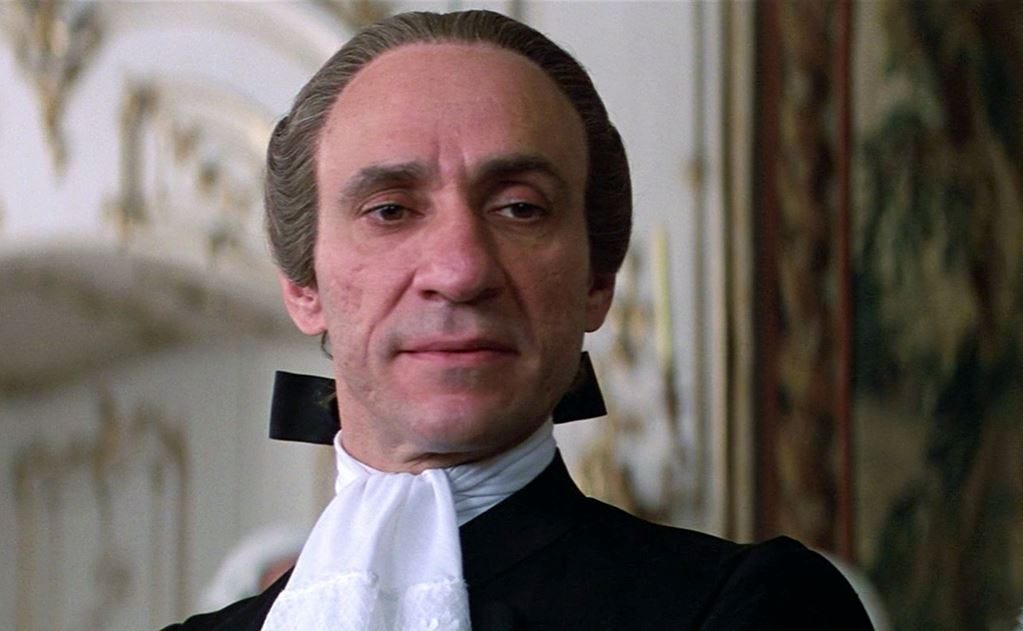Lights...Camera...Action!
My wife and I just watched “Conclave” (2024), and despite some silly parts (explosions! a pregnant nun! a hermaphrodite!) I really appreciated the movie’s focus on reflective judgment. Ambitious connivers are humbled by the call of conscience. Cardinals are reminded of the collective good and the consequences of their decisions. Again and again, they have to affirm their choices by solemn oath. There is an inescapable gravity to it, like “Twelve Angry Men” with better hats.
The same theme appears across many other Catholic films.
When I taught high school geography, I tried to show my classes one movie for each region we studied. For Latin America, we watched “The Mission” (1986), in which Jeremy Irons and Robert DeNiro play eighteenth-century Jesuits, ministering to Guaraní Indians in the highlands of Paraguay. They create an idyllic outpost, with communal ownership and prosperous farming. Unfortunately, their efforts are so successful that the owners of neighboring haciendas get jealous and want to expropriate the land and enslave the Indians. The Vatican sends a cardinal out to arbitrate. He tours the mission, praises the work that the priests are doing, but informs them that they have to abandon their flock and return with him. The Jesuits are under pressure across Europe and the order’s survival requires some strategic sacrifices. Refusal to cooperate will lead to the priests’ excommunication. They do refuse. Robert DeNiro (as a former mercenary) chooses to fight. Jeremy Irons (at his Jeremy-Irons-est) chooses to pray. Like pretty much everything in the class I taught, the ending is bloody and tragic. My students were so patient with me…
The best line comes at the end of the film, when the cardinal reads a report about the massacre. One of the planters contentedly chomps on his cigar, pleased with news of the slaughter. Another tries to offer some solace: “You had no alternative, your Eminence. We must work in the world. The world is thus.” To which the cardinal rightly replies: “No, Señor Hontar. Thus have we made the world. Thus have I made it.”
It’s a fitting end for a movie about irrevocable decisions, and it captures something that often seems missing from today’s classrooms: namely, what the political theorist Hannah Arendt describes as “action,” the uniquely human capacity to create a world through deliberation and collective endeavor, a world that is ultimately rooted in sincerity.
Like Aristotle, Arendt sees political action as the fulfillment of human life and the highest form of freedom. She conceives of politics in classically republican terms, freedom to be the government rather than freedom from the government, and a necessarily moral exercise. To participate as a citizen—speaking, voting, exercising power demonstratively and among equals—is qualitatively different from fulfilling one’s biological needs or engaging in forms of material production (which Arendt describes as “labor” and “work,” respectively), as well as from the domination of the private sphere and the pleasure- and profit-seeking of the social sphere. Arendt’s contribution to this classical vision of citizenship is that action is not only a matter of self-disclosure or self-revelation, but that it is ontologically constitutive. Individually and collectively, we are what we choose to do. The world comes into being when we exercise will, when we affirm responsibility through decisive action. Our choices may be unfair or tragic. We may weigh them through different standards. But in the end, they are ours.
Although Arendt thinks that children are unprepared to exercise this kind of responsibility, schools play an important role in exposing them to it. And movies may be the perfect medium through which to do so, deepening narrative arcs with visual cues, expressions, and pregnant silences.
Action appears not only with cinema’s saints, but sometimes with its demons. Since high school, my favorite movie has been Miloš Forman’s “Amadeus” (1984), in which F. Murray Abraham, as the composer Antonio Salieri, stalks and sabotages his young rival, Wolfgang Amadeus Mozart. He might do so out of petty jealousy, even insanity, but the film (drawing from a play by Alexander Pushkin) clearly puts him in the tradition of Milton’s Satan (“All is not lost; the unconquerable Will,/ And study of revenge, immortal hate,/ And courage never to submit or yield:/ And what is else not to be overcome?”), Dostoevsky’s Grand Inquisitor, and Camus’s Rebel. Confronted with an undeserving, obscene genius, seeing his own piety scorned, Salieri declares war on an unjust God. Far from today’s anti-heroes, with their foibles and moral gray areas, he is an individual in the purity of existential revolt.
Action can also appear in more mundane settings. If I was still teaching high school, I would probably be showing Terrence Malick’s “A Hidden Life” (2019), about Franz Jägerstätter, a conscientious objector during World War II. Jägerstätter is (quite literally) a saint, and he takes a stand that may seem out of reach for most of us. But the movie emphasizes that the choice is not only his. His wife, daughters, priests, neighbors, jailers, and executioners all face choices, which they bear with varying degrees of resolve. It is the intersubjective recognition of their shared plight that makes the movie so profoundly moving. As Simone Weil writes, “Imaginary evil is romantic and varied; real evil is gloomy, monotonous, barren, boring. Imaginary good is boring; real good is always new, marvelous intoxicating.” Jägerstätter’s is a transcendent good that comes from a simple, declarative refusal that is very much within our reach.







